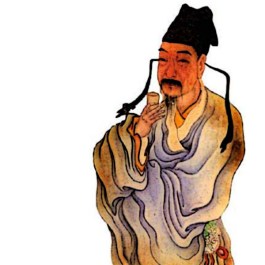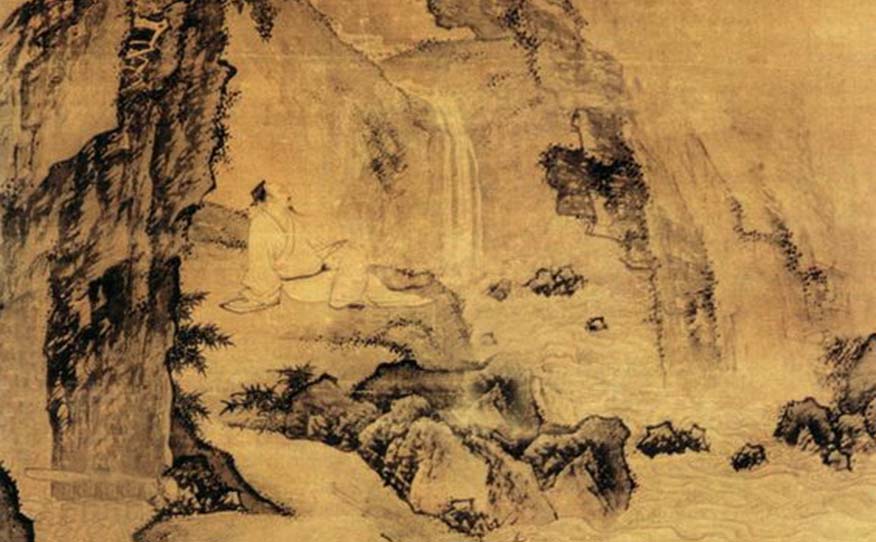Dispelling sorrow
In English, the title, 遣怀, of Du Mu’s poem is often given as Dispelling Sorrow. There are other choices equally as good: Drowning my sorrows or Scattering my sorrows, for example. One could also substitute for the word sorrows: woe, unhappiness, pain, regret, and so on. A longer translation is ‘easing the ache in my heart”.
Whatever title one gives it, the thought is a remembrance of better times.
Dispelling Sorrows
Down on my luck, wandering and drunk
Oh, those slim waisted girls of Chu in the palm of my hand
Ten years gone by, and still I dream of Yangzhou,
Why, even in the blue houses, you said I was fickle.
Sadly, the poem’s meter and rhyme are both lost in translation.Pinyin (phonetic Chinese)
Luòpòjiānghú zài jiǔ xíng,
Chǔyāo xiānxì zhǎng zhōng qīng.
Shíniān yī jué Yángzhōu mèng,
Yíngdé qīnglóu báo xìng míng.Chinese characters
杜牧
落魄江湖载酒行
楚腰纤细掌中轻。
十年一觉扬州梦,
赢得青楼薄幸名French translation, Dissiper la tristesse
Au bord de la rivière, le vin à la main
Rappelant ces filles minces, Si petit qu’ils pouvaient danser dans ma paume.
Dix ans passés, réveillés, À partir d’un rêve Yangzhou,
Où parmi les maisons bleues, J’ai gagné un nom pour la changeabilité
Du Mu, cowboy poet of the Tang dynasty

Du Mu is a late Tang poet whose death occurred about 50 years before the official end of the Tang dynasty.
He joined the imperial civil service at a young age and was assigned to the city of Yangzhou on the Yangtze River. It was “the most prosperous city in the whole world,” famous for rich merchant families, poets, courtesans, and scholars. Du Mu’s stay was relatively brief, followed by a succession of posts to minor prefectures, none with much success.
Ten years (十 年) go by. Like Rip Van Winkle, Du Mu wakens as if from a dream.
If we take the poem literally, Du Mu is now 35 years old and down on his luck. He consoles himself with a glass of wine (酒, also spirits generally) and reflects on those heavenly days in the blue houses (青楼) of Yangzhou with the slim waisted girls of Chu (楚, the district of Chu, also can mean “pain”).
Why even then, Du Mu recalls he had gained a reputation among the courtesans for fickleness (薄 幸) .
Wine as a motif
Wine is Du Mu’s relief and so, he is often picture with a glass of wine in his hand. Du Mu wrote several poems about drinking. One poem was entitled Drinking Alone, and another Drunken Sleep.
He died in 852 at the age of 49 in Chang’an, 50 years before the official fall of the Tang dynasty.
Dispelling Sorrow 杜牧
The title of the poem, 杜牧, is often translate as Dispelling Sorrow. Today one might say, drowning my sorrows in drink. Alternate translations: relieving my worries, awakening, and others that don’t make sense. How about washing away my worries with wine?
Du Mu, wine and women
One can imagine Du Mu, mounted on his pony, with his worldly possession packed in his saddle bags, traveling from town to town, trying to fit in, but never quite finding a place to settle down. In his sorrow he takes to spirits and song. Sounds to me like the makings of a country western song.
How about Tennessee Whiskey by Chris Stapleton? “I used to spend my nights out in a barroom. Liquor was the only love I’ve known, But you rescued me from reachin’ for the bottom, And brought me back from being too far gone.”
So what’s the difference between Chris Stapleton’s Whiskey and You and Du Mu?
“There’s a bottle on the dresser by your ring. And it’s empty so right now I don’t feel a thing. I’ll be hurting when I wake up on the floor. But I’ll be over it by noon.”
Poetry is the universal language and it speaks to us across time and across cultures.
In the palm of my hand as motif
English has a similar saying – “in the palm of my hand”. The words imply an ability to control another person.
Second line, the Chinese characters 楚腰 (Chǔyāo), Du Mu’s reference is to the Han beauty, Zhao Feiyan, Empress of the Western Empire (16–7 BC), who it is said was so light she could dance in the palm of the emperor’s hand.
“Why do you drink?” asked the girl.
“To forget,” replied the poet.
“Forget what?” inquired the girl, who was now sorry for him.
“Forget that I am a poet,” he confessed, hanging his head.“Not all who drink are poets,” said the girl.
“Don’t think I don’t know it,” said the poet.
The courtesan replies
Courtesans were not only beautiful but also accomplished in the arts. Yu Xuanji, for example, gives us the woman’s view:
at night, against my pillow,
I weep secret tears
by day, among the flowers,
I hide a broken heart
why, if we can make poets friends
then, should we not take lovers?












